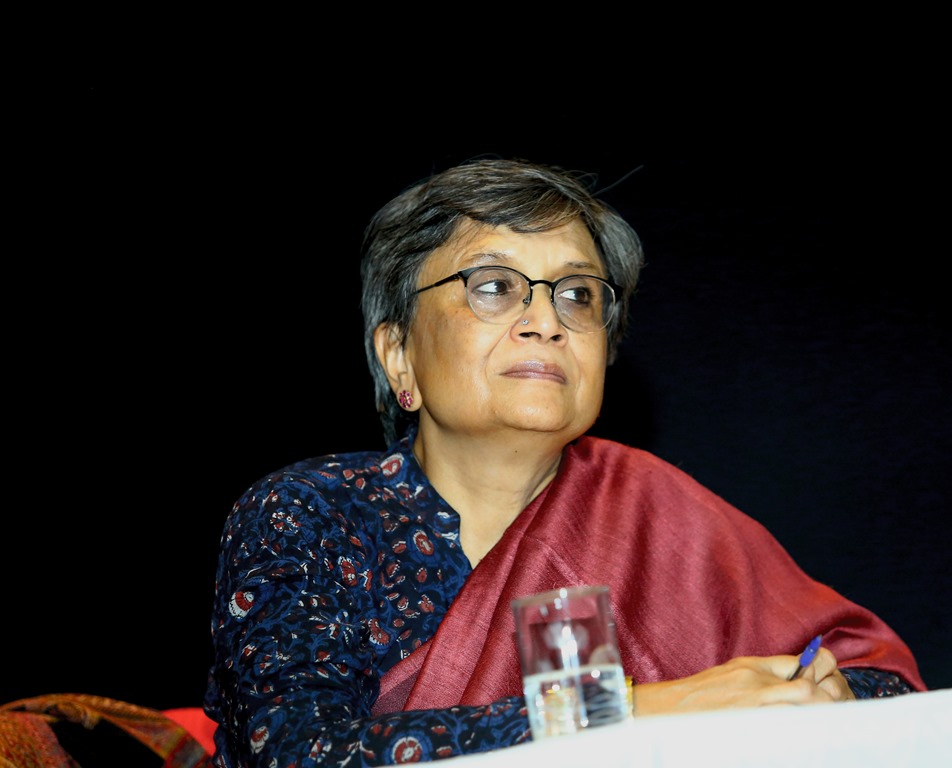- Professor Thapan, as a leading sociologist, you have worked extensively in the domains of social theories and gender studies. But then, your rigorous engagement with the sociology of education is truly remarkable. How did it happen?
My first engagement has been with education. I met J. Krishnamurti in November, 1973, and he invited me to go to Rishi Valley and spend time there. So, I arrived at Rishi Valley in June, 1974, a very young woman, with almost no experience of being with children, started working with the youngest, and was hooked for life. The one year I spent at Rishi Valley changed my view of education forever. I decided I wanted to be a school teacher. Ofcourse, that never happened but I did engage with schools as a researcher trying to understand what makes schooling tick, what goes on in the minds of children and teachers, how does schooling fill children with dreams, aspirations and views that are not necessarily about academic subjects alone, and how does education transcend everyday notions about ‘being educated’ to being one of the most transformative tools in society.
- Your ethnographic work has made it possible for us to understand the dynamics of Rishi Valley School—its pedagogic milieu, its possibilities and its ambiguities and contradictions. Why did you choose to study this school? Were you interested in the philosophy of Jiddu Krishnamurti?
I have indeed always been interested in the work of J. Krishnamurti, especially his educational thought, that did not treat schooling as mere information gathering but as having the potential to transform human minds. J. Krishnamurti was an unique philosopher, who did not lay down a blueprint for the schools he set up in India, UK and USA. He showed educators the tremendous possibilities that could be opened up if they could be learners as closely as they considered themselves teachers. He highlighted relationship as being the crux of all educational practice and school culture in all his schools is built on a relationship of close communication between teachers and students. It is a very precious aspect of being in school which is normally a site for authoritarian behavior, compulsory detentions, and disciplinary sanctions. Krishnamurti schools stand out for their abilities to engage in dialogue, to understand children and their complex worlds, to help children learn without fear, competition or comparison.
I was interested in Rishi Valley School as a research site in 1980 because of my earlier sojourn there that had left a lasting impression on me. I was also convinced that I would uncover innovative educational practices that would be of immense value to all those who work in the field of education. It was and still is a very special place in remarkable environs where children grow up in an atmosphere of affection and support.
- As a sociologist, how do you engage with Jiddu Krishnamurti—say, his constant urge to decondition the mind (‘truth is a pathless land’), his critique of organized religions, and his deep sensitivity to a new form of education: beyond exams, competitiveness and comparison?
Krishnamurti is a radical teacher, and allows no prior knowledge to color one’s insights. So, one has to listen to him or read him with a deconditioned and open mind. I cannot listen to him with sociological ‘barriers’ as it were! If we understand what he says, we can comprehend the vast potential that is opened up for change and that brings tremendous energy. His educational thought allows for great sensitivity to children and their fresh minds, to the openness that prevails among the young, to the possibilities for change when we relate to children without fear, compulsion, authority or comparison. These are very enabling aspects of educational practice and if we can provide an atmosphere or ethos to children where there is affection, care, sensitivity, dialogue, we are opening up the prospects for creating new minds. This does not mean that there is no conflict. Ofcourse there is! Children don’t want any modicum of ‘discipline’, or ‘rules’ and in any school, there is always a curriculum, a time-table, and some rules!
It is also important to understand that Krishnamurti believed in academic excellence and equally in the psychological development of both the teacher and the child. Unfortunately, in India, we have focused entirely on the academic aspect and neglected to pay adequate attention to the psychological aspects of growing up.
- There are critics who often argue that these ‘alternative’ visions of education have always been appropriated by the select elite. How do you see it? Or do you feel that Krishnamurti’s educational ideals can also be implemented in a relatively humble setting, provided we have the intense desire to do so?
All alternative visions of education are viewed as being ‘elitist’ because educationists consider the large public school mess that passes for education in this country as being too overwhelming to overturn. Young teacher trainees from Delhi University have often told me that the school structure is so well entrenched, the syllabus so overbearing, and their roles as teachers so circumscribed, that they are unable to do anything that they think Krishnamurti asks them to. While this may very well be so, it is not always the case that teachers are prohibited from being creative in their methods, or from treating all children with kindness and compassion, or from being their friends; it is far easier to slip into roles expected of us, rather than try to transform them to our, and children’s, advantage.
Secondly, Krishnamurti’s educational thought plays a significant role in rural school methodologies. Rishi Valley runs a residential middle school and seven satellite schools as part of our rural education programme. We have also developed the MultiGrade MultiLevel methodology that has been adopted by several states and countries internationally. The Rishi Valley Institute of Educational Resources (RiVER) has received many awards for this pioneering work in pedagogy that keeps the rural child at the centre of the learning process. It has been recognised as serving to accelerate learning among children while maintaining a close and mutually beneficial relationship with the community. I believe that Krishnamurti’s social and moral vision for inclusive education is at the heart of this endeavour. I have always felt that critics of the Krishnamurti schools particularly those who critique the ‘elitism’ associated with them have never seriously studied Krishnamurti’s thought or his work on the ground. If they did, they would see its applicability in all settings!
- You have nurtured a group of dedicated young researchers who have been contributing to the ethnographic studies of schools. Do you feel that academic bureaucrats and policy makers often fail to understand the implications of the nuanced details that these ethnographic works put forward?
Yes, it’s wonderful to work with young minds who share one’s passion! I have been fortunate to have some great students who have worked on diverse issues, including school ethnographies in different contexts. I think the bureaucracy is perhaps not interested in what’s happening on the ground unless it’s something they want to hear. Anil Bordia was an exception.
- We live amid violence, hyper-competitiveness and reckless consumerism. Under these circumstances, what should be the role of a teacher? Or is it that teachers have lost their agency, and been reduced into cogs in a ‘learning machine’?
The role of the teacher is increasingly significant in the lives of young people who live in complex societies. Every teacher is a powerful agent, fully capable of bringing about an awareness in the students, and help them to overcome their anxieties and challenges. Mental health takes the worst toll in the society you so well describe of violence, hyper-competitiveness and reckless consumerism. Helping young people to understand themselves, their relationships with one another, with their families, their aspirations and desires, in all of this, a teacher can be the best friend and can offer critical support. Teachers have not lost agency, they just do not see themselves as agential beings, perhaps because they are so often reduced to fulfilling so many other roles simultaneously. At Rishi Valley, we have been working on an online teacher enrichment programme that seeks to empower elementary school teachers in rural and small town India by helping them to not just develop their skills but also their reflective qualities, and agency in implementing their insights.
- After your retirement from Delhi School of Economics, you have chosen to devote yourself to Rishi Valley School. How do you feel? How do you reflect on the most fundamental question—the meaning of existence?
Avijit, this is a tough one: the meaning of existence! I must share with you that during my long tenure in the university, and in academia, I did not see myself as being part of only that life. That would have been too limited and circumscribed an existence! It helped that I was entrusted with running the D.S. Kothari Centre for Science, Ethics and Education in DU and could organize many events on themes close to my heart. I also helped enable the Shivlal Sawhney scholarship for MA Sociology students to conduct fieldwork for six weeks in Krishnamurti schools in India; and in a sense always kept the windows open: for fresh air from different spaces, perspectives, and contexts to come in and enrich my life in the university.
Life is what one makes of it: it is important to be grounded and not let one’s interests be too narrowly focused on only one aspect of sociology, or one method. A long time ago, when I was a student, I heard Prof Veena Das, who was then teaching at the Delhi School of Economics, say about a well-known American anthropologist: ‘Her work is so boring. She just focusses on this one thing and she has been doing that for so many years now’. I guess that stayed with me. I was deeply interested in, and influenced by the work of Basil Bernstein and Pierre Bourdieu, but not limited to them alone. I was fascinated by fieldwork methods, the reflexivity that anthropologists brought to their work, and the finely nuanced details of ethnography and writing. I had discussions with my teacher Prof TN Madan about many of these issues and it is through his wisdom and perceptions that I learnt many of my skills as an ethnographer. I was also influenced by feminist work and the relationship between women’s embodiment and identity which I explored in “Living the Body”. I also sought to understand the relationship between mobility, migration and lived experience, within India, and Europe. Questions about identity particularly interested me whether these were to do with religion, or being a migrant, a young girl or woman, or being a teacher in a school. At every step, I did not however fail to investigate schooling, for immigrant children, for adolescent girls, and boys, in privileged schools and in disadvantaged settings, for children who had experienced the horrors of 2002 in Ahmedabad, and many other settings in India and in France and Canada. The school and school culture remained of lasting interest and at the centre of all my explorations into society.
For me, therefore, coming to Rishi Valley is a very natural transition. It is like coming home after a very long absence but at the same time, now that I am here, I feel I was never away!











